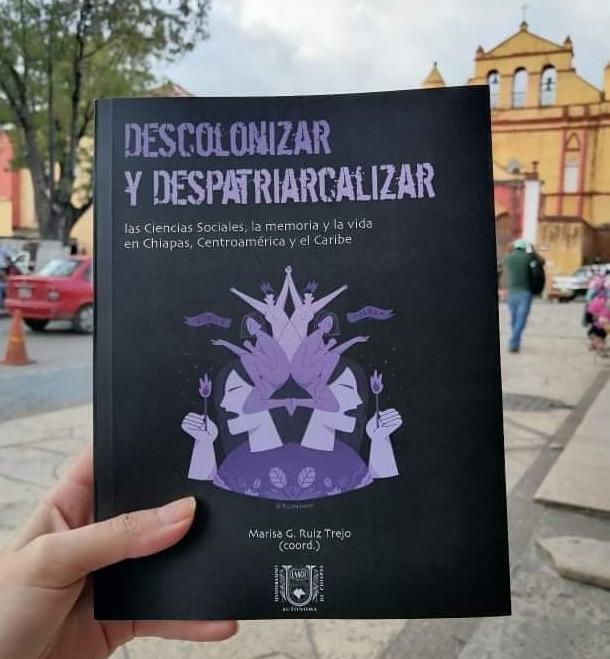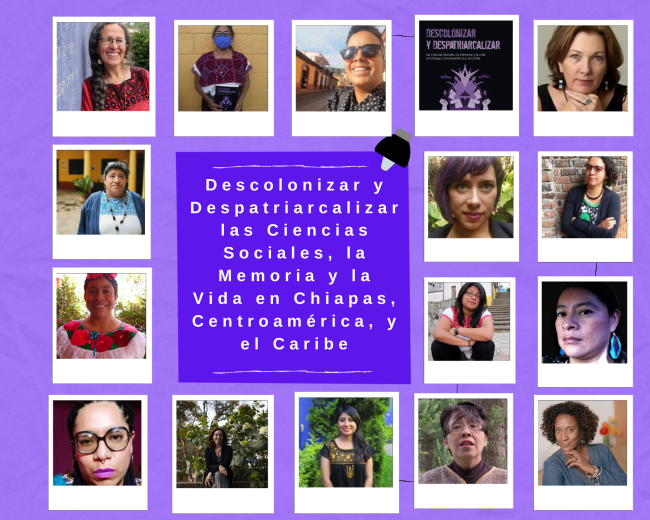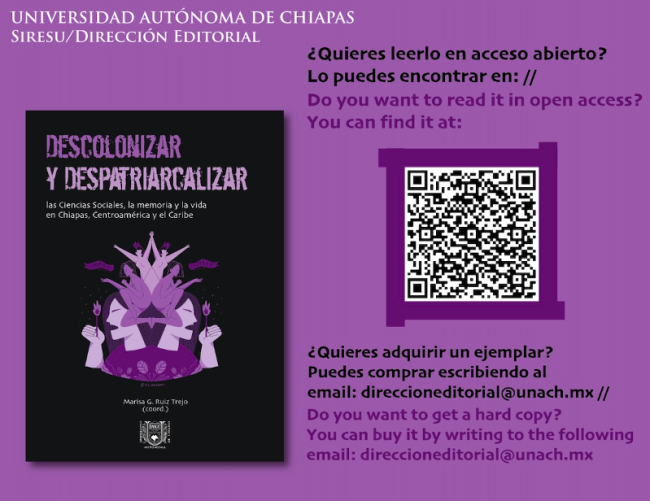
I am the first woman in my family to have the freedom to decide my fate. It’s also been about eight months since I became the head of my household. Growing up in a home where trauma and abuse were prevalent has made me acutely aware of the need to confront my family history and heal from these deep wounds. While my upbringing in the United States gave me more options than other women in my family, it did not spare me from the gendered violence plaguing Mexico. Being raised in a traditional Mexican household made it challenging for me and my sisters to escape the rampant machismo that is so often embedded within the Mexican nuclear family. It was only when I started to see these experiences as part of a larger pattern through the #niunamenos movement, that I began to make sense of my own story and the stories of the women in my life and history. As part of my healing journey, I am embracing change and turning to decolonial thought as a means to challenge patriarchal ideologies.
In November of 2022, Dr. Marisa Ruiz Trejo, a Mexican feminist professor, activist, and writer presented her latest book, Descolonizar y Despatriarcalizar las Ciencias Sociales, la Memoria y la Vida en Chiapas, Centroamérica, y el Caribe, at New York University. During the presentation, Ruiz Trejo shared some perspectives on the feminist movements that took shape throughout the Americas in the context of political unrest during the 20th and 21st centuries, and the voices that were invisibilized by western scholarship. The #niunamenos movement has been instrumental in bringing awareness to the violence perpetrated against women across Latin America, including Mexico. To find solidarity and inspiration, I have been drawn to works that portray women's resilience in responding to violence and hate with empathy and compassion. This book has shown me that it is possible to find ways to process experiences of abuse and trauma without letting them consume your life. I didn’t realize how much of an impact Ruiz Trejo’s presentation would have on my understanding of decolonial feminism and the importance of taking control of my narrative.
Uplifting Marginalized Voices
In her book, Ruiz Trejo takes us through the lived experiences and findings of several authors, including her own. In the process she serves as an author and curator, putting together a range of anthropological research, interviews, poems, short stories, and essays by decolonial anthropologists and writers on feminist theory, and their documentation of the fight for feminist liberation in Latin America and the Caribbean.
The heart of this book reclaims the narratives of Indigenous and Afro-descendant women, sexual dissidents, and feminist-revolutionary figures, and endeavors to change the way we investigate, document, and think about the social sciences. In the past, anthropological studies often excluded the perspectives and voices of these communities, who were viewed as objects of study rather than producers of knowledge. Ruiz Trejo's book sets out to rectify this wrong by making space for all the narratives that have traditionally been forgotten and deserve a seat at the table.
Across Latin America, feminist struggles against patriarchal violence mark the difference between life and death. Ruiz Trejo illustrates that feminist and anti-racist agendas in Chiapas, Central America, and the Caribbean are shaping the most significant battlefronts in the region today, and should not be separated from other realms of struggle. The region has some of the highest rates of gender-based violence in the world, involving femicide, violence against LGBTQI+ individuals, sexual assault, and domestic abuse. Approximately 12 women are killed every day. The situation is further heightened by the enduring legacies of racism, class discrimination, and prejudice against Indigenous people, which serve as barriers to social and political advancement. All of these issues need to be addressed simultaneously without betraying one cause to uplift the other.
Descolonizar y Despatriarcalizar (Decolonize and Depatriarchalize) is presented in seven sections and features the work of 15 writers, all of whom share their research to enhance awareness and scholarship on Latin American feminist anthropological studies.
In the first section of the book, Ruiz-Trejo takes a critical approach to anthropology itself, examining whose narratives have been traditionally recorded and valued. She addresses why so many anthropological works are unreflective of the regions they tried to encapsulate, due in large part to an androcentric lens that discarded input from the most vulnerable members of society: women, queer and trans folk, and Indigenous peoples. Xochitl Leyva Solano, an Afro-Indigenous feminist anthropologist in Chiapas, also contributes to this opening section, presenting a narrative of her advocacy work with the Zapatistas and other young revolutionaries in order to generate new perspectives on the work of active changemakers in a community. Solano reflects on overcoming neoliberal dispossession by the Mexican government by means of interweaving activism and academia in Chiapas in the 29 years since the Zapatista movement began.
“It was really women and other racialized people who I got the hardest push from,” writes Solano. “For the Zapatistas it was not a question of theory, of a concept, of a discourse, but of an alter and anti-prefigurative way of life that, as a lighthouse, helped us to find our way, our place in the world and in the cosmos".

Memory and Resilience
The following three sections focus on the testimonies of women who experienced systematic sexual violence during the Guatemalan civil war (1960-1996), as well as testimony from anthropologists working on the ground to document these and other tragedies. María Guadalupe García Hernández is a Guatemalan activist who founded Mamá Maquín, an organization of Guatemalan women refugees in Mexico. She details the women's fight for education, equal participation, Indigenous cultural recognition, and safe return to Guatemala.
Contributors Mabel Dalila Morales Sánchez and Anelí Villa Avendaño exhibit in their writings the legitimacy of memory and trauma as a source of knowledge. Their research focuses on the women of Mamá Maquín and other Maya women who survived the civil war, demonstrating the significance of creating a testimonial archive as a valid means of accessing and generating collective knowledge and healing, something that hasn’t always been honored in academia. Moreover, as many of the Indigenous women of Guatemala were surviving the horrors of genocide, they resisted by fostering love, fulfilling care responsibilities, and acting as a shield for their families to keep their communities afloat. Their resilience and strength are honored throughout these parts of the book.
The following sections of the book offer a different medium of anthropological research, gathering viewpoints and experiences through the artistic forms of poetry, short stories, and essays. These sections feature the work of Indigenous and Afro-Latinx artists and researchers.
Tito Mitjans Alayon, an Afro-Cubanx feminist and scholar who lives in Mexico, critiques how much of academia focusing on gender and the African diaspora in the Americas excludes the research of Afro-Latinx queer communities from south of the U.S. border, arguing for greater appreciation of their contributions. Mayra Santos Febres, an Afro-Puerto Rican writer, confesses it took her over 20 years to gather the courage to share her poems, but that in doing so, her work is contributing to the documentation of the African diaspora in the Spanish language.
Georgina Mendez Torres, a ch’ol Chiapanecan anthropologist, emphasizes the importance of preserving memory that is often transmitted through the spoken word. Myths, stories, and poems deserve to be published to establish a more comprehensive written record of the collective memory of Chiapas and Central America. She highlights a Mayan ritual, nichimal k’op, that helps individuals connect to their communities and the cosmos as a form of reverence of life itself. This ritual practice offers a spiritual alternative to Catholicism, another legacy of colonialism. The work of the artists and writers in this section remind us that without art there can be no culture; celebrating oral histories and artistic expression is a fundamental part of preserving our stories and identities.

La Memoria Tiene Género—Memory is Gendered
Ruiz Trejo believes that women remember historical events differently than men, and that the types of narratives being passed down are recounted in a different register. Women’s versions tend to be less self-aggrandizing and androcentric, encompassing the differentiated impacts that events have on a given community.
Guatemalan researchers Marta Casaús Arzu and Yolanda Aguilar, in conjunction with U.S. anthropologist Victoria Sanford, explain that the collective memory of a community is more likely to survive because women are recounting and passing down history, often through word of mouth. Women often rely on each other to make a collective archive of their shared struggles and traumas. Ruiz Trejo and her fellow anthropologists honor the importance of women’s knowledge produced in more domestic spheres, which is important to understanding and documenting historical events. The book serves as a reminder that formal education is not a prerequisite for grasping the essence of feminism and recognizing its potency. The women of Mamá Maquín think of themselves as truth-bearers and share these stories with the intention of honoring both the survivors and victims of Guatemala’s horrific civil war.
The final section of the book features testimony in the form of Mayan poetry, with contributions from Tzotzil writer Ruperta Bautista, Maya K’aqchiquel anthropologist Irma Alicia Velasquez Nimatuj, Tzotzil poet Juana Ruiz Ortiz, and Afro-Mexican writer Montserrat Aguilar. These poets use their work to open a dialogue about their truths, childhoods, and family histories. The poetry is also available in the Tzotzil language, serving to further decolonize the social sciences. In the poem “Vivencias,” Ruperta Bautista gestures to this process of truthtelling and healing:
The words sleep in the years,
some die of cold.
But the girls draw words,
that awaken with the dawn.
Decolonizing Immigration Movements and Building Solidarity
For the children of immigrants, moving through the numerous identities that relate to our culture, heritage, and traditions is a common struggle. One of the challenges we face is the tendency to view our cultures as uniform or singular, rather than a multitude of intersecting identities. We have to fight for everyone’s rights, and not limit ourselves to only advocating for the problems that affect us personally.
Just as Ruiz Trejo attempts to decolonize academia, diaspora communities must have uncomfortable conversations at home where patterns of discrimination are often reproduced. We can remedy the tendency to separate social issues by bringing an intersectional feminist approach to the dynamics affecting our families and communities. Feminism in Latin America is frequently belittled and ridiculed while femicide and gendered violence continues to be rampant. The path of decolonization will allow us to begin to heal the many wounds made by the numerous and overlapping systems of oppression that we live in.
This book comes at a time where the United States is seeing a high level of immigration from Central Americans seeking refuge and political asylum from the troubles they are facing back home. The text helps us grasp the implications of U.S. citizens ignoring the struggles occurring on the rest of our continent, which are not distant realities but part of the fabric and history of the United States as well. The testimonies and stories collected here call on us to develop bonds with social justice movements all over the Americas to build solidarity and coordinate efforts to help bring about change.
Ruiz Trejo's brilliant text demonstrates that our personal experiences are sufficient to comprehend and contribute to the hard work that feminism and decolonial thought demands. She reminds us of the contributions of Indigenous women, Afro-descendants, and feminist thinkers who “redefine geographies, places of memory, and spatial-temporal notions through long-standing memories and experiences, which has allowed them to act with greater responsibility before emergencies.”
Understanding the healing and mobilizing potential of feminism has never been more important. As I embark on my healing journey, I seek solace and comfort in the works of feminists, revolutionaries, and activists. Their words are a reminder that while we are not always in control of what happens to us, we can decide how to respond to your circumstances. This kind of transformative collaboration through a feminist lens should be uplifted throughout the Americas, and properly nourished through connection and community.
Kimberly Romano is a Mexican American writer and independent journalist focusing on Latin American socio-political movements. She graduated from SUNY Geneseo in 2018 with a BA in Political Science and Theater. She is based in New York City. You can contact her at kimberlyromano96@gmail.com.

